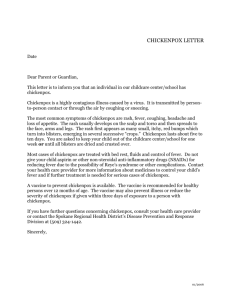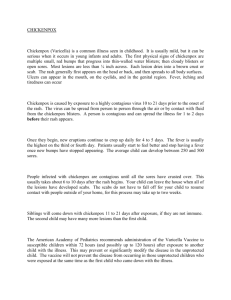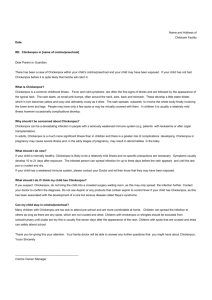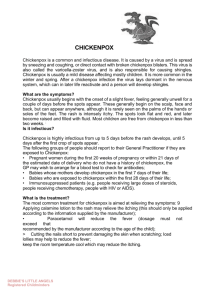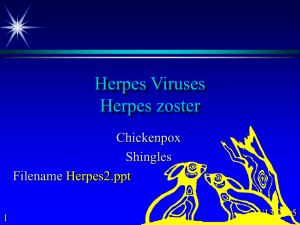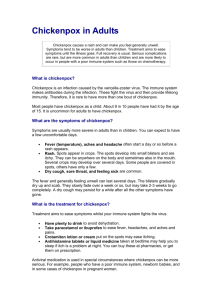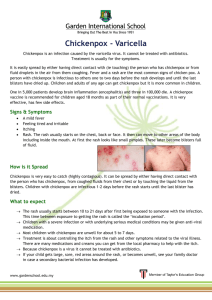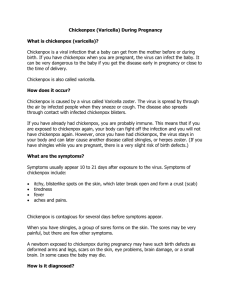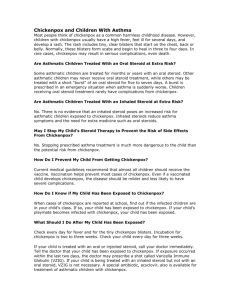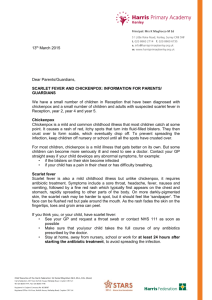Chicken Pox Fact Sheet - Center for Human Development
advertisement
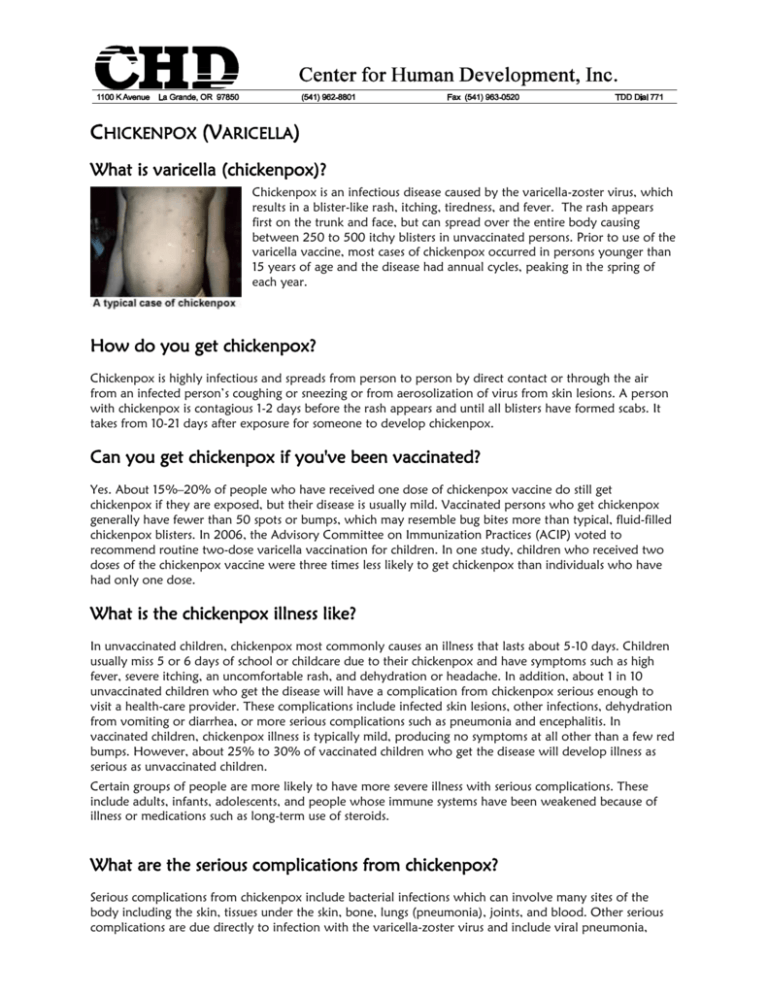
CHICKENPOX (VARICELLA) What is varicella (chickenpox)? Chickenpox is an infectious disease caused by the varicella-zoster virus, which results in a blister-like rash, itching, tiredness, and fever. The rash appears first on the trunk and face, but can spread over the entire body causing between 250 to 500 itchy blisters in unvaccinated persons. Prior to use of the varicella vaccine, most cases of chickenpox occurred in persons younger than 15 years of age and the disease had annual cycles, peaking in the spring of each year. How do you get chickenpox? Chickenpox is highly infectious and spreads from person to person by direct contact or through the air from an infected person’s coughing or sneezing or from aerosolization of virus from skin lesions. A person with chickenpox is contagious 1-2 days before the rash appears and until all blisters have formed scabs. It takes from 10-21 days after exposure for someone to develop chickenpox. Can you get chickenpox if you've been vaccinated? Yes. About 15%–20% of people who have received one dose of chickenpox vaccine do still get chickenpox if they are exposed, but their disease is usually mild. Vaccinated persons who get chickenpox generally have fewer than 50 spots or bumps, which may resemble bug bites more than typical, fluid-filled chickenpox blisters. In 2006, the Advisory Committee on Immunization Practices (ACIP) voted to recommend routine two-dose varicella vaccination for children. In one study, children who received two doses of the chickenpox vaccine were three times less likely to get chickenpox than individuals who have had only one dose. What is the chickenpox illness like? In unvaccinated children, chickenpox most commonly causes an illness that lasts about 5-10 days. Children usually miss 5 or 6 days of school or childcare due to their chickenpox and have symptoms such as high fever, severe itching, an uncomfortable rash, and dehydration or headache. In addition, about 1 in 10 unvaccinated children who get the disease will have a complication from chickenpox serious enough to visit a health-care provider. These complications include infected skin lesions, other infections, dehydration from vomiting or diarrhea, or more serious complications such as pneumonia and encephalitis. In vaccinated children, chickenpox illness is typically mild, producing no symptoms at all other than a few red bumps. However, about 25% to 30% of vaccinated children who get the disease will develop illness as serious as unvaccinated children. Certain groups of people are more likely to have more severe illness with serious complications. These include adults, infants, adolescents, and people whose immune systems have been weakened because of illness or medications such as long-term use of steroids. What are the serious complications from chickenpox? Serious complications from chickenpox include bacterial infections which can involve many sites of the body including the skin, tissues under the skin, bone, lungs (pneumonia), joints, and blood. Other serious complications are due directly to infection with the varicella-zoster virus and include viral pneumonia, bleeding problems, and infection of the brain (encephalitis). Many people are not aware that before a vaccine was available approximately 10,600 persons were hospitalized and 100 to 150 died as a result of chickenpox in the U.S. every year. For information about serious infections following chickenpox visit the following site: Outbreak of Invasive Group A Streptococcus Associated with Varicella in a Childcare Center -- Boston, Massachusetts, 1997 www.cdc.gov/mmwr/preview/mmwrhtml/00049535.htm Can chickenpox be prevented? Yes, vaccination with the recommended two-doses of varicella vaccine prevents chickenpox in most people. Can you get chickenpox more than once? Yes, but such occurrences are uncommon. For most people, one infection appears to confer lifelong immunity. Chickenpox in children is usually not serious. Why not let children get the disease? It is not possible to predict who will have a mild case of chickenpox and who will have a serious or even deadly case of disease. Now that there is a safe and effective vaccine, it is not worth taking this chance. “CHD does not discriminate on the basis of race, sex, religion, national origin, family status, age or disability. For further information about this policy, contact Human Resources, 541-962-8811, or TTY 1-800-735-2900 or dial 771.”
